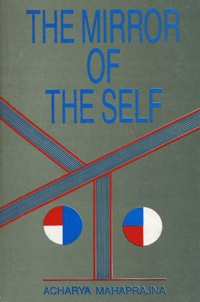The Goal And The Path
A man wanting to practise preksha meditation first of all seeks initiation into it. To seek to be initiated into meditation means - to present oneself for the practice of meditation, to take the pledge therefore, to choose the path of sadhana, and to determine one's goal. The novice-sadhak accepts initiation into meditation by taking the following pledges:
Abhutthiomi aarahnaae
1 present myself for the practice of preksha meditation.
Itfaggam uvasampajjaami
1 accept the path of spiritual meditation.
Sammatam uvasampajjaami
I accept the initiation into insight.
Sanjamam uvasampajjaami
I accept the intiation into spiritual experience.
The Right Path Is Self-RestraintThe first thing is to be mentally prepared for preksha meditation. Without it nothing gets done. Secondly, after one is mentally prepared, one must find a path. Without a path, a man goes astray. So it is very necessary to find a path. The path is the path of spiritual practice. To follow the path of spirituality - that is the path of preksha meditation. Thirdly, it must be the right path. If a wrong path is adopted, it would not lead one to one's goal. The right path is that which takes one to one's destination. The goal and the path - the conjunction of the two denotes the right path. If one is bound for Bikaner, but starts traversing the path leading to Jodhpur, it would not be the right path. The road leading to Jodhpur is all righ, but it is not the right path to take if one wants to go to Bikaner. One's objective and the method one adopts to realize it, must be in harmony with each other. The right path is that which leads one in the direction of one's goal. The problem is that man is not able to formulate his goal. He who practises meditation must have a definite goal. How will a man fare who does not know where he is going?
Acceptance Of The Principles Of InitiationThe objective of preksha meditation is the development of spiritual consciousness, i.e., the evolution of inner consciousness. We are used to looking outwards. Our objective is to awaken the inner eye so that we can look within; spirituality is our goal. If spiritual progress is our objective, to indulge in idle gossip in this market place will not be the right path. The right way would be-to control the body, to exercise self-restraint in one's speech and in one's food, and to control the mind.
So, finally we come to self-restraint. One's objective may be the right objective, the path adopted may also be right, but in the absence of self-restraint or self-control, nothing will get accomplished. Your car may be moving in the right direction, following the road leading to your destination, but if the brakes fail, how will you reach there? The whole undertaking becomes very risky. Without sell-control, one can land oneself in a very dangerous situation.
Mental preparation for spiritual practice, the choice of a path, the determination of a goal and the acceptance of sadhana - these serve as four pillars of light for the practitioner of preksha meditation. In the light of these four pointers alone is progress in the field of sadhana possible.
Resolution For MeditationThe acceptance of the four signposts mentioned above marks the first step in the direction of the practice of preksha meditation. The second step in this direction is to accept the principles of initiation into meditation. There are five principles:
- Mindfulness
- Freedom from reaction
- Friendliness
- Frugal diet
- Moderation in speech or silen
The acceptance of initiation into meditation and the principles thereof forms a preliminary introduction to sadhana. After such an acceptance, a man is ready for the practice of meditation and he gets established in the posture of meditation. Through the auspicious recital of 'Arham', he creates around himself an armour of feeling. Later, he recites the sacred aphorism - Sampikkhae appagamappaenam ('Observe the soul through the soul'). Then, in accordance with the prescribed goal, the sadhak gives utterance to his resolution for meditation - "I am practising preksha meditation for the purification of my consciousness." With the enunciation of this resolve, the sadhak is set to engage himself in the practical work of meditation which involves a series of exercises:
- Kayotsarg (Relaxation)
- Internal Trip
- Perception of Deep Breathing
- Perception of Breathing Through Alternate Nostrils
- Perception of Body
- Perception of Psychic Centres
- Perception of Psychic Colours
- Contemplation
All these exercises constitute the essential elements of preksha meditation. Practising these with deep faith and firm determination, a man comes to discover the secret of healthy, peaceful and pure living. He continually advances towards his goal. Preksha meditation is the right means for the achievement of a right end. Let us adopt this way of meditation and we shall find ourselves progressively moving towards our cherished goal.
 Acharya Mahaprajna
Acharya Mahaprajna

